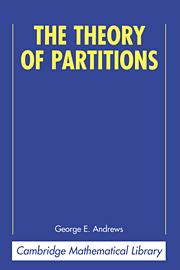Book contents
- Frontmatter
- Editor's Statement
- Contents
- Preface to Paperback Edition
- Preface
- Chapter 1 The Elementary Theory of Partitions
- Chapter 2 Infinite Series Generating Functions
- Chapter 3 Restricted Partitions and Permutations
- Chapter 4 Compositions and Simon Newcomb's Problem
- Chapter 5 The Hardy–Ramanujan–Rademacher Expansion of p(n)
- Chapter 6 The Asymptotics of Infinite Product Generating Functions
- Chapter 7 Identities of the Rogers–Ramanujan Type
- Chapter 8 A General Theory of Partition Identities
- Chapter 9 Sieve Methods Related to Partitions
- Chapter 10 Congruence Properties of Partition Functions
- Chapter 11 Higher–Dimensional Partitions
- Chapter 12 Vector or Multipartite Partitions
- Chapter 13 Partitions in Combinatorics
- Chapter 14 Computations for Partitions
- Index for Definitions of Symbols
- Author Index
- Subject Index
Editor's Statement
Published online by Cambridge University Press: 10 February 2010
- Frontmatter
- Editor's Statement
- Contents
- Preface to Paperback Edition
- Preface
- Chapter 1 The Elementary Theory of Partitions
- Chapter 2 Infinite Series Generating Functions
- Chapter 3 Restricted Partitions and Permutations
- Chapter 4 Compositions and Simon Newcomb's Problem
- Chapter 5 The Hardy–Ramanujan–Rademacher Expansion of p(n)
- Chapter 6 The Asymptotics of Infinite Product Generating Functions
- Chapter 7 Identities of the Rogers–Ramanujan Type
- Chapter 8 A General Theory of Partition Identities
- Chapter 9 Sieve Methods Related to Partitions
- Chapter 10 Congruence Properties of Partition Functions
- Chapter 11 Higher–Dimensional Partitions
- Chapter 12 Vector or Multipartite Partitions
- Chapter 13 Partitions in Combinatorics
- Chapter 14 Computations for Partitions
- Index for Definitions of Symbols
- Author Index
- Subject Index
Summary
A large body of mathematics consists of facts that can be presented and described much like any other natural phenomenon. These facts, at times explicitly brought out as theorems, at other times concealed within a proof, make up most of the applications of mathematics, and are the most likely to survive changes of style and of interest.
This ENCYCLOPEDIA will attempt to present the factual body of all mathematics. Clarity of exposition, accessibility to the non-specialist, and a thorough bibliography are required of each author. Volumes will appear in no particular order, but will be organized into sections, each one comprising a recognizable branch of present-day mathematics. Numbers of volumes and sections will be reconsidered as times and needs change.
It is hoped that this enterprise will make mathematics more widely used where it is needed, and more accessible in fields in which it can be applied but where it has not yet penetrated because of insufficient information.
The theory of partitions is one of the very few branches of mathematics that can be appreciated by anyone who is endowed with little more than a lively interest in the subject. Its applications are found wherever discrete objects are to be counted or classified, whether in the molecular and the atomic studies of matter, in the theory of numbers, or in combinatorial problems from all sources.
Professor Andrews has written the first thorough survey of this many sided field. The specialist will consult it for the more recondite results, the student will be challenged by many a deceptively simple fact, and the applied scientist may locate in it the missing identity he needs to organize his data.
Information
- Type
- Chapter
- Information
- The Theory of Partitions , pp. viPublisher: Cambridge University PressPrint publication year: 1984
